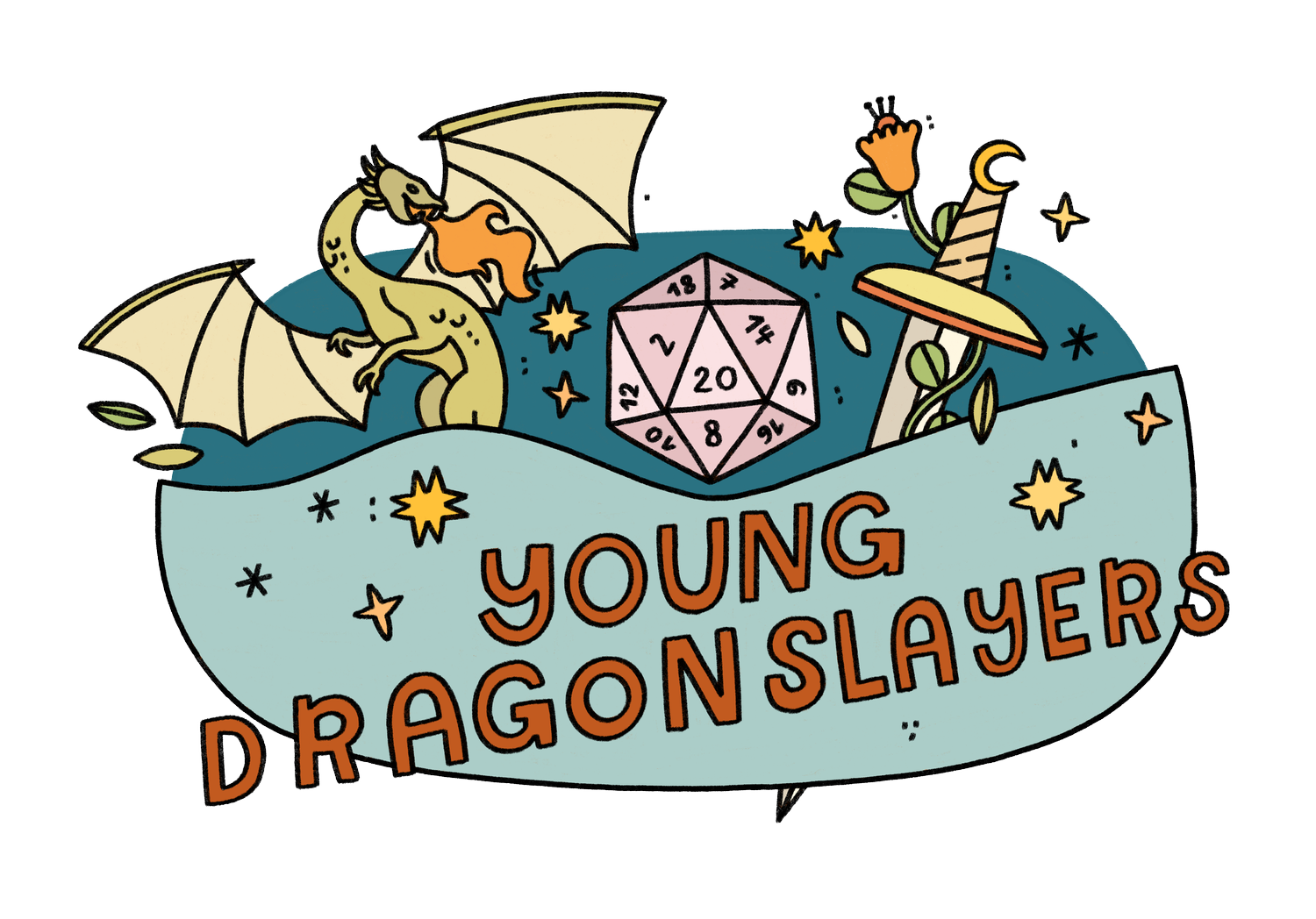Behind the Screen: D&D’s Social Secret to Leadership Development
Dungeons and Dragons is a creative, immersive game that has captured the imagination of tweens and teens everywhere. In addition to being a fun and fulfilling hobby, D&D bosts an array of social-emotional benefits. Playing as a character in a collaborative, imaginative story gives kids a chance to build skills like teamwork, empathy, and compassion.
But there’s another benefit to D&D that you may not have considered: its potential to develop confident leaders. A D&D game is nothing without a good Dungeon Master, also known as a DM. The DM serves as an emcee and narrator, setting the stage for the other players. They set the stage, keep the story on track, and provide challenges for players to overcome.
Stepping into this sometimes thankless (but always in demand!) role allows kids to engage with their peers in a new way, while learning leadership skills that will serve them well both in and out of the game. Keep reading to learn how!
Forbes Agrees: D&D is a Catalyst for Leadership
Sure, we think D&D creates great leaders. But you don’t have to take our word for it—Forbes Magazine, known for its takes on business and entrepreneurship, agrees. Check out this 2018 article, which covers 8 lessons in leadership you can learn through playing and facilitating D&D games.
According to the article, one of D&D’s strengths is encouraging players to embrace their own quirks, rather than conforming to somebody else’s idea of how a leader should look or act. Because the community embraces all kinds of people, it opens the door to many types of leadership. Rather than toning down your “weirdness”, D&D encourages you to embrace and celebrate it. Plus, the inclusive nature of modern D&D means that underrepresented groups are increasingly given a “seat at the table.”
This supportive and welcoming atmosphere, DMs can learn about collaboration, trustworthiness, and flexibility as they figure out their own style of leadership. In our experience, this is just the tip of the iceberg. Tweens and teens can pick up several additional skills through running their own games that will serve them well in school, friendship, and life in general.
D&D Helps Kids Become Effective Public Speakers
Celebrity DMs (yep, they’re a thing) are often known for their amazing vocal range. It’s the Dungeon Master’s job to narrate the party’s adventure, while also giving voice to every minor character the team encounters along the way. No wonder so many performers and voice actors are D&D aficionados: you can be a simple tavern keeper one minute, and the world’s most powerful vampire the next.
Not every DM has to love doing character voices—there’s room for all kinds of leaders in D&D—but being an engaging public speaker is part of the job. As the leader of the game, it’s on you to make sure that your players are paying attention and invested in the story. Through trial and error, even shy DMs can develop their own personal storytelling style.
Running D&D games helps young players increase their awareness and control of their vocal pitch, tone, and tempo. Varying these characteristics helps players avoid monotone speech, and creates a more interesting experience for their listeners.
Leading D&D Games Boosts Executive Functioning
Ah yes, executive functioning skills. The abilities that help us learn, work, follow through on tasks, and generally be self-motivated, independent human beings. Executive functioning is what helps us make decisions, prioritize tasks, practice self-control, and generally stay focused when everything (or everyone) around us is trying to get us off task…hmm…sounds suspiciously like a Dungeon Master’s job.
The Dungeon Master is the only participant in a game who has to prepare for sessions in advance. This can be a lot of work, which is why a good DM is hard to find! As the lead storyteller, its’ the DM’s job to come up with scenarios that their players will likely encounter in their next session: perhaps the next clue they need to solve a mystery, or a meeting with a character who will deliver a quest. The thing is, you can’t plan for everything. DMs have to identify the most important elements of their story, and prioritize preparing for those while leaving smaller details to be improvised in the moment.
Each session requires the DM to make many rapid-fire decisions that will alter the outcome of the game. Should a creature emerge from the forest here to attack the players, or have we already spent too much time wandering in the woods? If the players are struggling in battle, should you weeaken their opponent or allow them to fail? How would a lowly villager respond if he just witnessed your party’s sorceror spontaneously burst into flames? With practice, DMs learn to both read the room and trust their gut. They learn to be confident with their decisions, knowing that they are doing what they think is best for their friends and the story they are telling.
Finally, the Dungeon Master is usually the player who is watching the clock. While other players are fully immersed in their character and the story, DMs are keeping an eye on pacing. They’re the ones guiding players toward the finish line, helping them accomplish satisfying goals without spending too long dilly dallying on tasks that might not lead them anywhere. This requires a lot of focus in the face of chaos: even when your players are goofing around, you’ve gotta keep your eye on the prize.
Group Leaders Manage the Party and Resolve Conflict
Speaking of staying focused in the mist of chaos…running a D&D game means that you’ll inevitably reach a point where players disagree. Being a good leader means helping your group to resolve conflict, and learning how to help the many different personalities who find their way to your table learn how to get along.
Because players work together as a party, negotiation and consensus are a part of the game. Not everyone will automatically agree on what direction to explore next, or whether to fight the monster or flee. As the DM, you’re not responsible for the party’s decision, but it is your job to make sure everyone stays civil and the group doesn’t spend too long debating their options.
Other in-game disagreements may be a little harder to solve. Maybe two of your players have a rivalry, and are constantly trying to one-up each other. Or maybe someone has said or done something that really hurt another player’s feelings. D&D characters can serve as an extension of yourself, so even in an imaginary game, sometimes conflicts feel a little bit personal.
A good game leader sets ground rules in advance to make sure that everyone is on the same page about what is and isn’t okay during the game. They’re also paying attention to body language and nonverbal cues to make sure all their players are having a good time. And, when big conflicts arise, it’s the DM’s job to calmly step in and remind everyone of the agreements they made together. If we all said there’d be no murder hobos, then Blunog the Barbarian is not allowed to attack that defenseless baby owlbear without consulting the group.
Deal with Disappointment Like a Boss
You know what they say about the best laid schemes. You can have the most beautiful, ingenius session planned out for your players, and it’s always possible that they’ll steamroll right over it to do something else entirely. It’s nothing personal, and they probably won’t even realize what they’ve done! But it’s hard not to take their decisions personally when you’ve poured so much effort and love into a beautiful setting or NPC that, as it turns out, may never see the light of day.
Emotion regulation is an important, and often overlooked, part of leadership. You can’t lose your cool when you’re the boss. Like it or not, running a D&D game provides many chances to cope with frustration, disappointment and setbacks. But here’s the weird thing: you might actually discover that you do like it. In D&D, it’s often more interesting to fail than it is to succeed.
This is part of what makes D&D so unique: you aren’t just there to win, you’re there to tell a good story. And good stories include unexpected twists and turns. If your hero automatically got what they wanted with no conflict, it would be boring. So as cliche as it might sound, failures in D&D really are opportunites in disguise.
As a leader, it’s important to learn how to think flexibly. You don’t want to be thrown off course the first time something goes wrong, or cling desperately to a plan that isn’t working. Instead, you want to learn how to embrace uncertainty, so you can adapt quickly and come up with new ideas. You may find that the creative, unexpected, and downright weird events that happen as a result of your players unexpected antics end up being more entertaining than anything you could have written on your own.
Develop Leadership Skills Through D&D!
Do you have a kid or teen in your life looking for a chance to lead? Learning how to DM your own games is a really fun way to step into a leadership role and learn important social-emotional skills…without feeling like you’ve stepped into an after school special or stumbled into an HR meeting. Plus, playes who know how to DM are always in demand. Becoming an expert DM means you’ve got a way to assemble a group of peers together, and don’t have to just sit around waiting to be invited to play.
If your experienced D&D player is ready to learn to DM, we have just the thing over here at Young Dragonslayers™. Our leadership camps periodically, and our online course, Dragon Leaders, is available year-round for aspiring Dungeon Masters.
If your player is brand new to D&D or doesn’t feel ready to DM yet, our weekly groups are a great way to practice social skills, make new friends, and observe professional DMs in action. You can learn about our games and sign up for our waitlist here.




